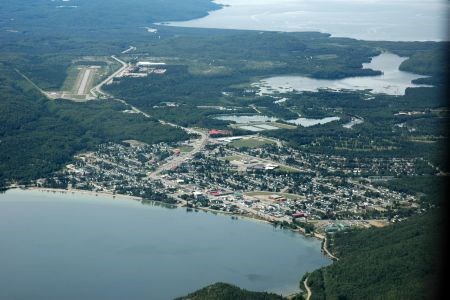After seven years of waiting to see if a controversial Wawa trap rock quarry becomes reality, what's a few more weeks?
The Town of Wawa, an open-pit miner and a group of conservation-minded residents are waiting on the Ontario Municipal Board to render a verdict on a controversial trap rock quarry on Lake Superior.
After four weeks of hearings that concluded in late April, residents and the Superior Aggregates Company were anticipating the quasi-judicial body to make a decision sometime in June on whether the Michipicoten Harbour development can commence operations.
Superior Aggregates trap rock quarry proposal has been a flash point for objections raised by a small group of lakeside homeowners and cottagers who question building an industrial development.
The township wants the quarry to go ahead to kick-start a harbour revitalization project that could employ 30 people and result in a large private investment in a dilapidated commercial dock.
Superior Aggregates is a subsidiary of the Carlos Companies, an American construction conglomerate that bought the 400-acre site in 2000. The proposed quarry sits next to a dock once used by Algoma Steel to ship iron ore from an inland mine near Wawa.
“Obviously the quarry is the means to get the dock going,” said Wawa Mayor Howard Whent, who views the harbour as an essential transportation infrastructure asset in capitalizing on the town's regional geographic location as a multi-modal service hub.
“We think it's going to be quite significant over time in terms of what the future (holds) for us.”
Whent said the Carlos group has a solid environmental track record and the
quarry has raised no red flags among all government ministries.
Though the Wawa area is proving to be fertile for gold producers and diamond explorers, the town's economy has taken major hits over the years.
Weyerhauser closed its Wawa oriented strand board in October, 2007 throwing 132 employees out of work. A decade earlier, Algoma Steel closed into Algoma Ore Division in 1998 and eliminated 220 jobs.
Whent said a rebuilt dock would be a valuable asset for moving wood pellets, barging out lumber and other bulk forest products from shuttered forestry mills in the area. ”It could make a decision on who opens and who doesn't in the future.”
Questioning the whole process has been a citizens' group of nine cottagers and homeowners on the bay.
Joel Cooper, spokesperson for the Concerned Citizens for Michipicoten Bay, said if the OMB decision goes against them, they can live with the outcome.
“If it's against us, we've done our best and feel satisfied with that,” said Cooper, who is retired and maintains a bayside home since 1982.
“In the last seven years, we've had the best experts we can hire, a lawyer, and taken advantage of all the public participation opportunities and been a watchdog for the town, company and the Ontario government.”
The group had challenged the quarry on municipal planning principles and under Ontario's Aggregate Resources Act in the company's bid for a licence in 2004.
They took issue with the quarry being located in the midst of a vast stretch of wilderness coastline on Lake Superior. They also had issues with noise from the operation and protection of woodland caribou migratory habitat.
Cooper doesn't want his group branded as obstructionists to development but prefers it be located further inland and off the shoreline.
“We consider ourselves to be the voice for Lake Superior.”
The project has split the community between people who see the economic development potential and those who view it as potential threat to the shoreline.
“We've been after the truth (to) ensure decisions are based on the best information being presented.”
Whent said the project has been all government ministry approvals with no red flag issues raised and mitigative efforts were made to alleviate noise and dust concerns.
Superior Aggregates mine manager Bruce Staines was anticipating the upcoming OMB decision will allow him to exercise this title soon. “We're confident about the outcome.”
The plan is to mine 500,000 tonnes of rock annually as part of a largely year-round open-pit operation.
Staines said exact employment numbers will depend on markets and the expected addition of one of a number of “significant” Canadian partners they are dealing with for a joint venture operation.
“Once we get our licence, we'll get serious about our negotiations with which Canadian partner we'll chose.”
Staines, who has managed several underground mines, said operating an open pit is relatively easy. The equipment list will likely include a primary jaw crusher, cone crushers, screens, front end loaders, along with conveyors to stockpile inventory to load onto a Great Lakes freighter.
Most of the operation will be shielded from view. A narrow opening, like a highway rockcut, will be blasted near the dock to reduce outside sight-lines of the quarry's operation. The ridge will be well-treed to further shield the quarry from view.
A considerable private investment would go into the adjoining 1,500-foot commercial dock.
Staines said the timbered wharf, above the waterline, has deteriorated greatly and needs repairs with new sheet piling and bollards to secure vessels. Though the draft at the dock is only 22 feet, Staines said a standard 730-foot self-unloading vessel can load between 21,000 and 22,000 tons of aggregate. A large 1,000-foot laker can take on 46,000 tons.
www.superioraggregates.com
www.ccmb.ca
www.wawa.cc




